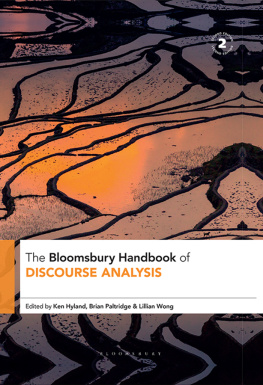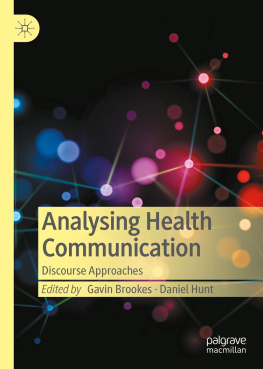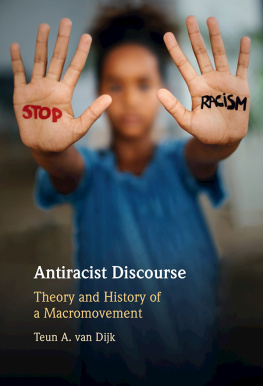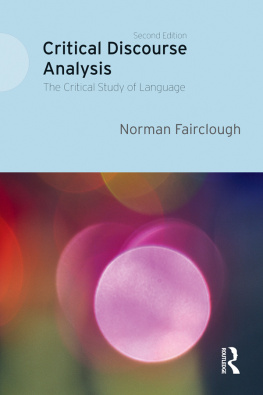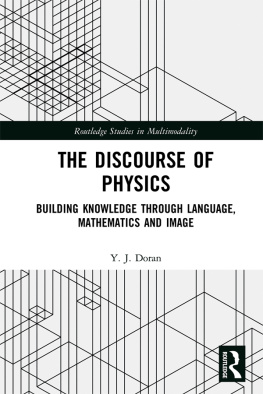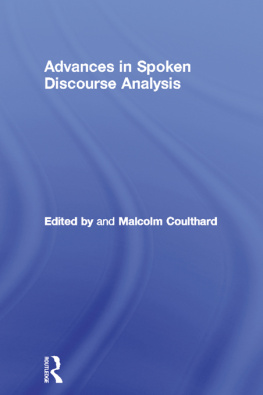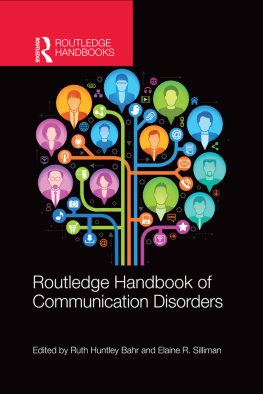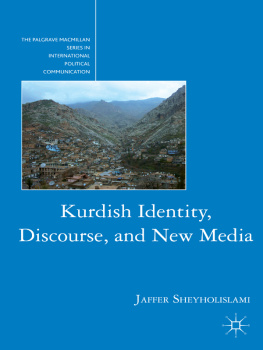Discourse Analysis in Adults With and Without Communication Disorders
A Resource for Clinicians and Researchers
Discourse Analysis in Adults With and Without Communication Disorders
A Resource for Clinicians and Researchers
Carl A. Coelho, PhD, CCC-SLP, BC-ANCDS
Leora R. Cherney, PhD, CCC-SLP, BC-ANCDS
Barbara B. Shadden, PhD, CCC-SLP, BC-ANCDS


5521 Ruffin Road
San Diego, CA 92123
Email:
Website: https://www.pluralpublishing.com
Copyright 2023 by Plural Publishing, Inc.
Typeset in 10.5/13 Minion Pro by Flanagans Publishing Services, Inc.
Printed in the United States of America by McNaughton & Gunn, Inc.
All rights, including that of translation, reserved. No part of this publication may be reproduced, stored in a retrieval system, or transmitted in any form or by any means, electronic, mechanical, recording, or otherwise, including photocopying, recording, taping, web distribution, or information storage and retrieval systems without the prior written consent of the publisher.
For permission to use material from this text, contact us by
Telephone: (866) 758-7251
Fax: (888) 758-7255
Email:
Every attempt has been made to contact the copyright holders for material originally printed in another source. If any have been inadvertently overlooked, the publisher will gladly make the necessary arrangements at the first opportunity.
Disclaimer: Please note that ancillary content (such as documents, audio, and video, etc.) may not be included as published in the original print version of this book.
Library of Congress Cataloging-in-Publication Data:
Names: Coelho, Carl A., editor. | Cherney, Leora Reiff, editor. | Shadden, Barbara B. (Barbara Bennett), editor.
Title: Discourse analysis in adults with and without communication disorders : a resource for clinicians and researchers / [edited by] Carl Coelho, Leora R. Cherney, Barbara B. Shadden.
Description: San Diego, CA : Plural Publishing, Inc., 2022. | Includes bibliographical references and index.
Identifiers: LCCN 2022019113 (print) | LCCN 2022019114 (ebook) | ISBN 9781635503753 (paperback) | ISBN 1635503752 (paperback) | ISBN 9781635503760 (ebook)
Subjects: MESH: Communication Disorders--diagnosis | Communication | Adult Aging--physiology
Classification: LCC RC423 (print) | LCC RC423 (ebook) | NLM WL 340.2| DDC 616.85/5--dc23/eng/20220523
LC record available at https://lccn.loc.gov/2022019113
LC ebook record available at https://lccn.loc.gov/2022019114
Contents
Carl A. Coelho, Barbara B. Shadden, and Leora R. Cherney
Heather Harris Wright, Topic Chair
Andrea Marini
Stephen Kintz and Hana Kim
Marion Leaman and Aviva Lerman
Mary Boyle, Topic Chair
Lucy Bryant
Lucy Dipper and Madeline Cruice
Jamie H. Azios and Nina Simmons-Mackie
Elizabeth Armstrong, Tara Lewis, Alice Robins, Ian Malcolm, and Natalie Ciccone
Leanne Togher, Topic Chair
Elise Elbourn, Joanne Steel, and Elizabeth Spencer
Louise C. Keegan, Nicholas Behn, Emma Power, Susan Howell, and Rachael Rietdijk
Melissa D. Stockbridge, Jamila Minga, Alexandra Zezinka Durfee, and Melissa Johnson
Rachael Rietdijk and Peter Meulenbroek
J. B. Orange, Topic Chair
Sarah Grace Dalton, H. Isabel Hubbard, and Jessica D. Richardson
Jackie Guendouzi
Katharine Aveni and Angela Roberts
Sharon Ash and Sanjana Shellikeri
Carl A. Coelho, Co-editor
Davida Fromm and Brian MacWhinney
In the early 1980s, Carl Coelho was working as a speech-language pathologist in an acute rehabilitation hospital. There were 40 beds devoted to stroke rehabilitation and 20 beds for traumatic brain injury (TBI). It was a great environment to learn about adult neuro disorders. During this period, he became interested in the cognitive communication behavior of patients with TBI and struggled with how best to characterize their deficits. Fortunately, Carl worked close to the University of Connecticut, where he had completed his doctorate, and remained in contact with two of his mentors, Betty Liles and Robert Duffy. When they would meet, he often described patients he worked with. During one of these conversations, Betty suggested that he should make recordings of their narrative discourse. With her assistance, Carl began to analyze discourse samples from the TBI patients, which shed new light on the nature of their disrupted communication.
At about the same time, Leora Cherney was pondering how best to address the communication impairments of right hemisphere stroke patients she was seeing daily in the rehabilitation facility where she was working. She was struck by the relative paucity of information that these patients conveyed in the context of fluent, often verbose, language production. In some ways, this was not unlike the communication of patients with early dementia of the Alzheimers type (DAT). So, for her doctoral dissertation, Leora decided to compare the discourse of these two groups of patients to begin to tease out the contribution of right hemisphere lesions to the language of DAT.
Meanwhile, Barbara Shadden was facing a different challenge. After moving to the University of Arkansas to pursue her research about the experience of living with aphasia, she discovered that access to individuals with aphasia was quite limited. There was, however, a large population of older residents, many retirees from other parts of the country. Barbara soon found herself fascinated by the limited information available about communication in typically aging adults. She began searching for ways to assess language in a more functional manner, particularly discourse in all its forms. Early research outcomes underscored the heterogeneity of discourse skills in her subjects, and the complex interaction of factors such as tasks, elicitation methods, cognitive challenges, and personal relevance. One intriguing finding was that the discourse of some of the outliers in these typically aging adults looked a lot like the communication of those with conditions such as dementia and right hemisphere disorders. It was quite clear that few discourse assessment clinical tools and measures were available to speech-language pathologists and that normative data were limited.
So how did we come together? Over the next years, other researchers were also studying the discourse of persons with acquired language disorders. More publications were appearing in research journals, but the clinical value of discourse analysis was not appreciated. There was a well-established Education and Training Department at the Rehabilitation Institute of Chicago, where Leora was working. Aware of the gap in knowledge regarding discourse analysis, she sought out the opportunity to organize a 2-day workshop with the support of Don Olson, the Director of Education and Training. Leora and Barbara had already met at a conference where Barbara was presenting on discourse in the elderly. To complement their expertise, they invited Carl to join them, rounding out their experience with discourse in various neurologic patient populations to include TBI. The initial workshop in 1992 was so successful that, over the next 4 years, it was repeated several times not only in Chicago, but also in Dallas and San Francisco. The workshops focused on the clinical application of discourse analysis for adults with acquired language disorders. Subsequently, Don encouraged the three of us to write a book. The discourse manual was published in 1998 and became informally known as the Green Book. It became a popular resource for many clinicians and researchers interested in discourse assessment.


